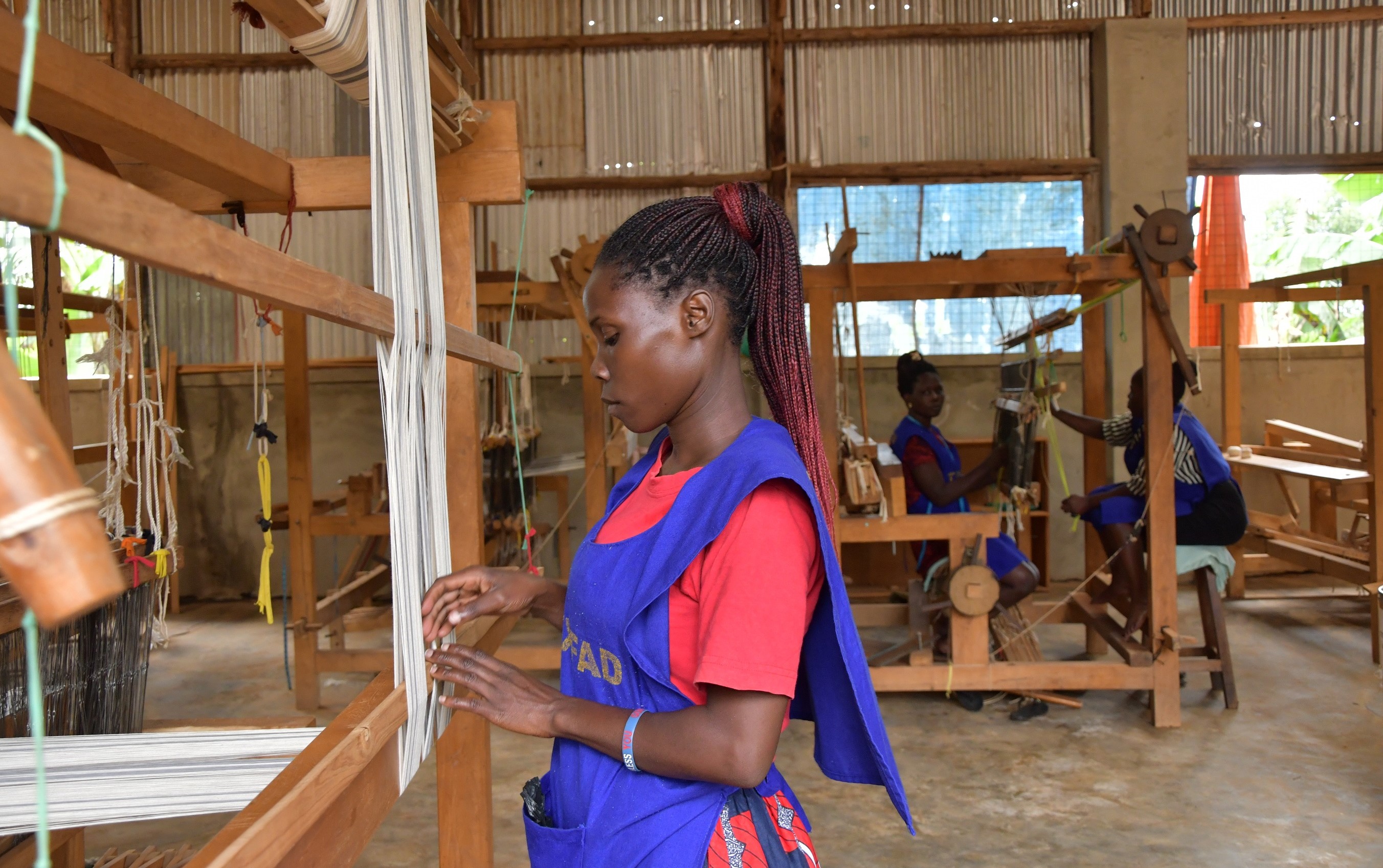Banana Fiber: An Alternative Textile for People and Planet
April 23, 2024

TEXFAD staff weave clothing products from banana fiber
Banana is a major food crop for half of the Ugandan population, with approximately 75 percent of farmers cultivating it. The country records the highest per capita consumption of banana in the world at 220-400kg per annum.
Banana production in Uganda has been driven mainly by household consumption rather than commercial goals. With the annual matooke production of over 6 million tons, it is estimated that 70 percent is for household consumption while 30 percent is for sale.
In 2005, the Government of Uganda established the Presidential Initiative on Banana Industrial Development, under which a banana processing factory was set up to produce matooke (East African Highland Banana) flour and other matooke products. However, the processed flour has gained little domestic market acceptance, which implies difficulties influencing how Ugandans utilize and perceive matooke.
Agro-commodity supply chains are generally long and complex, and that of matooke is hardly exceptional; along the matooke value chain, it is estimated a matooke bunch changes hands five to seven times. In 2020, the banana export amounted to USD $3 million, and only 5 percent of bananas were suggested to cross the Ugandan border.
Beyond the fruit, the banana stem which contains the fiber and other parts of the plant haven’t been put to so profitable use, instead put to waste and becoming a pollutant through decomposition and thus producing methane. According to the United Nations Environment Programme (UNEP), methane is the primary contributor to the formation of ground-level ozone, a hazardous air pollutant and greenhouse gas, exposure to which causes 1 million premature deaths every year. Methane has accounted for roughly 30 percent of global warming since pre-industrial times and is proliferating faster than at any other time since record keeping began in the 1980s.

Mr. Okello John Baptist, TEXFAD Operations Manager, demonstrates the banana fiber extraction process
TEXFAD, a United Nations Development Programme (UNDP) grantee under the Youth4Business Innovation and Entrepreneurship Facility, is a textiles, fashion and design company whose major raw material is banana fiber. Since partnering with UNDP in 2019, TEXFAD has created employment, preserved the environment, and improved the livelihoods of banana farmers across Uganda. This week, UNDP and YouthConnekt Uganda embarked on a learning visit to TEXFAD, accompanied by 20 female youth, to expose young people to new skills and trades.
Since partnering with UNDP, TEXFAD has trained 125 young people (95 women) in Western Uganda. TEXFAD produces clothing, carpets, hair pieces and addresses vegan leather needs through producing plant-based belts, shoes and bags. Beyond clothing needs, the company has also ventured into further utilizing waste to produce briquettes for cooking, thus mitigating the use of wood charcoal and in turn conserving the environment.

Youth attend a learning visit at the TEXFAD factory
The learning visit conducted by UNDP and YouthConnekt Uganda proved successful in spurring creativity and innovation within the youth enterprises who participated, including Hellen Munyasa CEO Helton Traders who noted “Looking at these materials, I see a great opportunity for partnership since I am also using waste products to produce sewing threads. It’s inspiring to see what other young enterprises are doing.”
UNDP has supported TEXFAD and other youth-led enterprises with exposure to national and regional markets through the YouthConnekt Africa (YCA) Summit and various other national forums, providing networking opportunities and an opportunity for the enterprise to gain greater visibility, market and business connections.
The opportunities for young people in Uganda are immense, with creative and innovative solutions offering a unique avenue to drive job creation and livelihoods strengthening. The time to explore these opportunities and prepare youth to benefit is now!
By Mercy Melody Kayodi, Youth and Innovation Programme Officer
UNDP and YouthConnekt
In Uganda, UNDP’s Youth for Development flagship programme is empowering young people through skilling and enterprise development to become the leaders, innovators and changemakers who are shaping the future of Uganda, Africa and the world. Through the Youth4Business Innovation and Entrepreneurship Facility, youth-led enterprises are being supported to spur impact-driven entrepreneurship, tackle youth unemployment, leverage innovation and create jobs and livelihoods opportunities through sectors including agriculture, manufacturing, development minerals, renewable energy, ICT, tourism and creative arts.
Part of the YouthConnekt Africa (YCA) network, YouthConnekt Uganda is a joint initiative between UNDP and the Government of Uganda designed to enhance the knowledge, experience and skills of young people, while investing in their ideas, innovations and initiatives.

 Locations
Locations